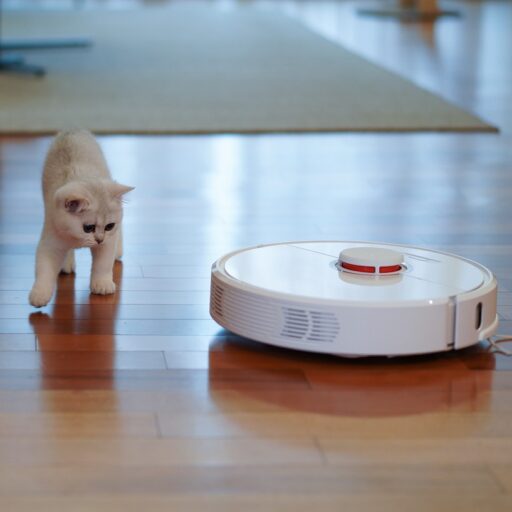Support our educational content for free when you purchase through links on our site. Learn more
What is the Life of a Robot Mower? [2024] 🤖🌱

Imagine a world where you can sit back, relax, and let a robot take care of your lawn. No more pushing heavy mowers or spending hours under the scorching sun. Robot mowers have revolutionized lawn care, making it easier and more convenient than ever before. But have you ever wondered, what is the life of a robot mower? How long can you expect it to last? In this comprehensive guide, we’ll dive deep into the world of robot mowers, exploring their lifespan, advantages, disadvantages, and everything in between. So, let’s get started and uncover the secrets of these autonomous lawn caretakers!
Table of Contents
- Quick Answer
- Quick Tips and Facts
- Background and History of Robot Mowers
- Advantages of Robot Mowers
- Disadvantages of Robot Mowers
- How Long Do Robot Mowers Last?
- How Often Should You Mow Your Lawn with a Robot Mower?
- Are Robot Lawn Mowers Worth It?
- FAQ
- Conclusion
- Recommended Links
- Reference Links
Quick Answer
The life of a robot mower can vary depending on various factors such as the quality of the mower, maintenance, and usage. On average, with regular maintenance, you can expect a robot mower to last about 10 years. However, some high-quality models can last even longer, while others may have a shorter lifespan. It’s important to choose a reliable brand and follow the manufacturer’s guidelines for maintenance to ensure the longevity of your robot mower.
👉 CHECK PRICE on: Robot Mowers | Walmart | eBay | Etsy
Quick Tips and Facts
- Robot mowers are designed to operate autonomously, cutting grass within a defined boundary.
- They use sensors and navigation systems to avoid obstacles and navigate the lawn efficiently.
- Robot mowers are battery-powered and can automatically return to their charging station when the battery is low.
- They are generally quieter than traditional mowers, making them ideal for residential areas.
- Robot mowers require the installation of a boundary wire to define the mowing area.
- Some models can handle slopes and uneven terrain, while others are better suited for flat lawns.
- Regular maintenance, such as cleaning the blades and sensors, is essential for optimal performance and longevity.
Background and History of Robot Mowers

Robot mowers have come a long way since their inception. The idea of a robotic lawn mower dates back to the 1960s when researchers and inventors began exploring the concept of autonomous mowing machines. However, it wasn’t until the late 1990s that the first commercial robot mowers became available.
The early models were basic and had limited capabilities. They required the installation of a perimeter wire to define the mowing area and had limited programming options. Over the years, advancements in technology have led to the development of more sophisticated robot mowers with improved navigation systems, longer battery life, and advanced features.
Today, robot mowers are becoming increasingly popular, offering homeowners a convenient and time-saving solution for maintaining their lawns. With advancements in artificial intelligence and robotics, we can expect even more advanced and efficient robot mowers in the future.
Advantages of Robot Mowers
Robot mowers offer a range of advantages that make them an attractive option for homeowners. Let’s take a look at some of the key benefits:
-
Time-saving: With a robot mower, you can reclaim your weekends and spend more time doing the things you love. The autonomous nature of these mowers means you can set them to mow while you relax or attend to other tasks.
-
Convenience: Say goodbye to the hassle of pushing a heavy mower or dealing with messy gasoline. Robot mowers are easy to use and require minimal effort. Simply set up the boundary wire, program the mowing schedule, and let the robot do the work for you.
-
Quiet Operation: Unlike traditional mowers that can be noisy and disturb the peace, robot mowers operate quietly. You can enjoy a peaceful environment while the robot quietly maintains your lawn.
-
Efficiency: Robot mowers are designed to mow frequently, which promotes healthier grass growth. They cut the grass in small increments, allowing the clippings to act as natural fertilizer, resulting in a lush and healthy lawn.
-
Safety: Robot mowers are equipped with advanced safety features, such as sensors that detect obstacles and automatically change direction. This minimizes the risk of accidents and ensures the safety of children and pets.
-
Environmentally Friendly: Robot mowers are powered by rechargeable batteries, reducing the carbon footprint compared to gas-powered mowers. Additionally, the frequent mowing and natural fertilization promote a greener and healthier lawn.
-
Cost-effective: While the initial investment in a robot mower may be higher than a traditional mower, the long-term cost savings can be significant. You’ll save on fuel costs, maintenance, and potentially even lawn care services.
Disadvantages of Robot Mowers
While robot mowers offer numerous advantages, it’s important to consider the potential drawbacks before making a purchase. Here are some disadvantages to keep in mind:
-
Initial Cost: Robot mowers can be more expensive than traditional mowers. However, the long-term cost savings and convenience they offer may outweigh the initial investment.
-
Installation and Setup: Setting up a robot mower requires the installation of a boundary wire to define the mowing area. This process can be time-consuming and may require some technical knowledge.
-
Limited Mowing Area: The mowing area of a robot mower is determined by the length of the boundary wire. If you have a large lawn, you may need to invest in additional wire or consider a different mowing solution.
-
Weather Limitations: Robot mowers are designed to operate in various weather conditions, but extreme weather, such as heavy rain or snow, may require them to be temporarily taken out of service.
-
Maintenance: While robot mowers require less maintenance compared to traditional mowers, they still require regular cleaning and blade sharpening. Neglecting maintenance can affect their performance and lifespan.
-
Boundary Wire Maintenance: The boundary wire may need occasional adjustments or repairs due to factors like landscaping changes or accidental damage.
-
Lack of Aesthetic Control: Robot mowers focus on functionality rather than aesthetics. They may not create the same precise patterns as a human-operated mower, which some homeowners may prefer.
How Long Do Robot Mowers Last?
The lifespan of a robot mower can vary depending on several factors. High-quality robot mowers, when properly maintained, can last up to 10 years or even longer. However, lower-quality models may have a shorter lifespan.
To ensure the longevity of your robot mower, it’s important to choose a reputable brand known for producing durable and reliable products. Follow the manufacturer’s guidelines for maintenance, which typically include regular cleaning, blade sharpening, and software updates.
Regular maintenance not only extends the lifespan of your robot mower but also ensures optimal performance. Neglecting maintenance can lead to decreased efficiency, reduced battery life, and potential breakdowns.
How Often Should You Mow Your Lawn with a Robot Mower?
One of the advantages of robot mowers is their ability to mow frequently, resulting in a healthier and more vibrant lawn. The ideal mowing frequency depends on factors such as grass growth rate, weather conditions, and personal preferences.
In general, it’s recommended to set your robot mower to mow at least once a week during the growing season. However, you may need to adjust the frequency based on the specific needs of your lawn. For example, during periods of rapid growth or heavy rainfall, you may need to increase the mowing frequency to prevent the grass from becoming too long.
It’s important to strike a balance between frequent mowing and allowing the grass to grow to a healthy length. Mowing too frequently can stress the grass, while mowing too infrequently can result in an overgrown and uneven lawn.
Are Robot Lawn Mowers Worth It?
Robot lawn mowers can be a significant investment, but for many homeowners, they are worth every penny. Here are a few factors to consider when determining if a robot mower is worth it for you:
-
Lifestyle: If you value your time and prefer to spend it on activities other than lawn care, a robot mower can be a game-changer. It frees up your weekends and eliminates the need for manual labor.
-
Lawn Size: Robot mowers are well-suited for small to medium-sized lawns. If you have a large lawn, you may need multiple robot mowers or consider other options.
-
Maintenance: While robot mowers require regular maintenance, it is generally less intensive compared to traditional mowers. If you’re looking for a low-maintenance lawn care solution, a robot mower is worth considering.
-
Long-term Cost Savings: While the initial cost of a robot mower may be higher, the long-term cost savings can be significant. You’ll save on fuel costs, maintenance, and potentially even lawn care services.
-
Environmental Impact: If you’re conscious of your carbon footprint and want to reduce emissions, a robot mower is an environmentally friendly choice.
Ultimately, the decision of whether a robot mower is worth it depends on your individual needs, preferences, and budget. Consider the advantages and disadvantages, and weigh them against your specific circumstances to make an informed decision.
FAQ

How long do robot mowers last?
With regular maintenance, expect a robot mower to last about 10 years. However, some high-quality models can last even longer, while others may have a shorter lifespan.
What are the disadvantages of a robotic mower?
Some disadvantages of robotic mowers include the initial cost, installation and setup, limited mowing area, weather limitations, maintenance requirements, boundary wire maintenance, and the lack of aesthetic control.
Read more about “What are the disadvantages of a robotic mower?”
Are robot lawn mowers worth it?
Robot lawn mowers can be worth it for homeowners who value their time, have small to medium-sized lawns, prefer low-maintenance solutions, want long-term cost savings, and are conscious of their environmental impact. Consider the advantages and disadvantages to determine if a robot mower is worth it for you.
Read more about “The Ultimate Guide to Choosing the Best Robot Lawn Mower for 2 Acres …”
How often should you mow your lawn with a robot mower?
Set your robot mower to mow at least once a week during the growing season. Adjust the frequency based on grass growth rate, weather conditions, and personal preferences.
Read more about “The Ultimate Guide to Robot Lawn Mowers … 🤖🌿”
Conclusion

In conclusion, the life of a robot mower can span around 10 years with regular maintenance. These autonomous lawn caretakers offer numerous advantages, including time-saving, convenience, quiet operation, efficiency, safety, and environmental friendliness. However, it’s important to consider the potential disadvantages, such as the initial cost, installation requirements, and maintenance. By choosing a reliable brand, following maintenance guidelines, and considering your specific needs, you can enjoy the benefits of a robot mower for years to come.
So, why wait? Embrace the future of lawn care and let a robot mower take the reins! Your lawn will thank you, and you’ll have more time to enjoy the things you love.
Recommended Links
- 👉 CHECK PRICE on: Robot Mowers | Walmart | eBay | Etsy
- Further Reading:

